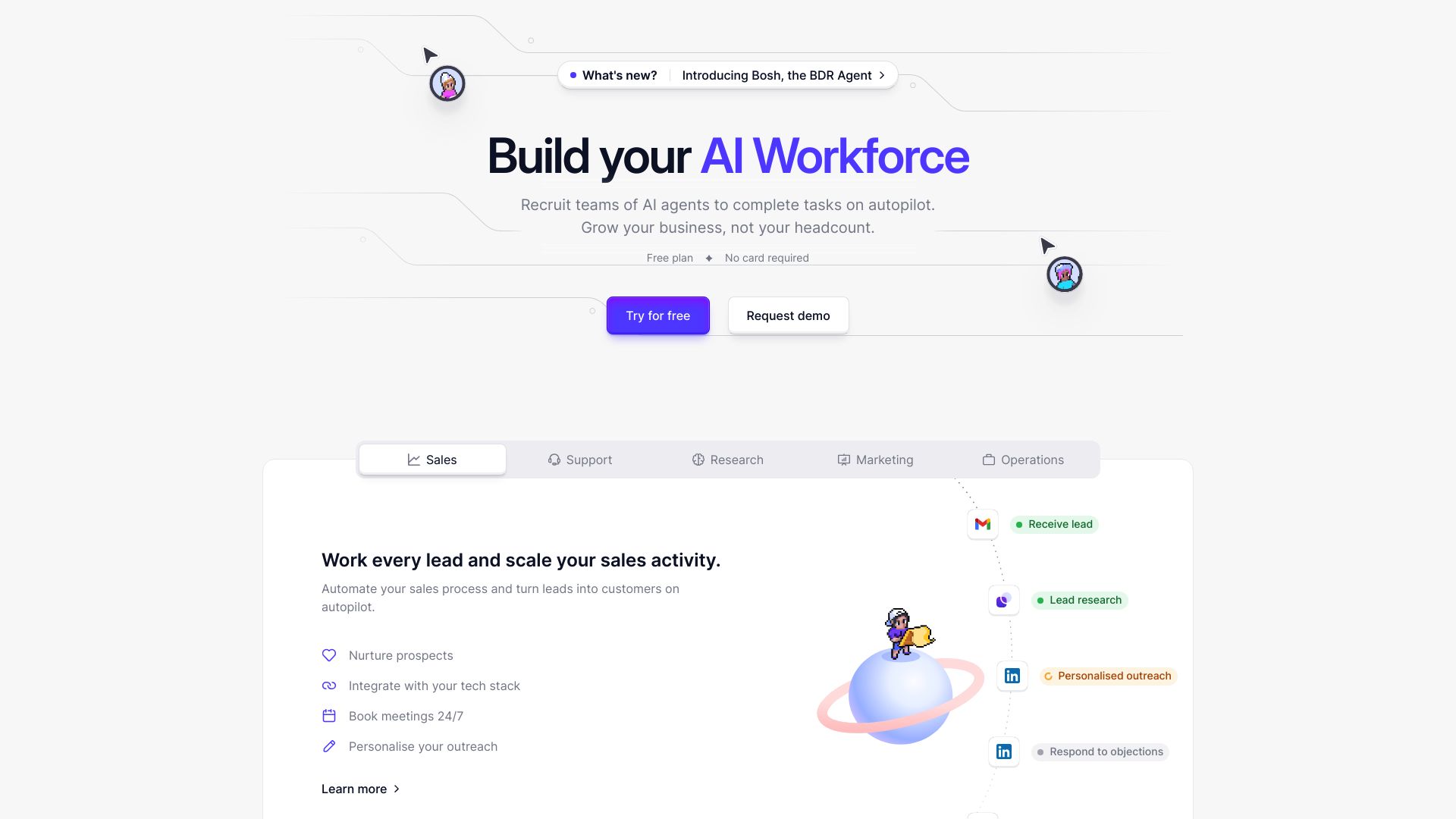AutoGPT vs. Relevance AI: Comparing AI Agent Platforms
Autonomous AI agents revolutionize how businesses tackle complex tasks and streamline operations. AutoGPT vs. Relevance AI stand at the forefront of this innovation, each offering unique approaches to AI development and deployment. This comparison delves into the strengths and limitations of these platforms, examining their core features, ease of use, and potential applications.
We’ll explore how AutoGPT’s focus on autonomous task completion compares to Relevance AI’s low-code environment, and introduce SmythOS as a comprehensive alternative that combines powerful AI capabilities with user-friendly design. Whether you’re a developer seeking advanced AI tools or a business leader looking to integrate AI into your workflow, this analysis will guide you through the landscape of AI agent platforms, helping you make an informed decision for your AI development needs.
AutoGPT Overview
AutoGPT empowers developers to create autonomous AI agents capable of completing complex tasks without constant human input. This open-source platform leverages GPT-4 or GPT-3.5 APIs to enable AI agents that can self-prompt, make decisions, and execute multi-step processes.


AutoGPT’s visual builder simplifies agent creation through a drag-and-drop interface, allowing users to construct AI workflows without extensive coding knowledge. This no-code approach democratizes AI development, making it accessible to a broader range of users beyond traditional programmers.
AutoGPT’s visual builder simplifies agent creation through a drag-and-drop interface, allowing users to construct AI workflows without extensive coding knowledge.
The platform excels in task decomposition, breaking complex goals into manageable sub-tasks. AutoGPT agents maintain short-term memory to provide context for ongoing operations, enhancing their problem-solving capabilities. The system supports both text and image inputs, offering versatility in handling various data types.
While AutoGPT provides powerful tools for AI agent development, it faces challenges in long-term memory retention and potential for recursive loops. The platform’s reliance on large language models can lead to high operational costs, which may impact scalability for some users. Additionally, the autonomous nature of the agents requires careful monitoring to prevent unintended actions or errors.
AutoGPT integrates with REST APIs and supports custom plugins, expanding its functionality and allowing for seamless connection with external tools and services. The platform’s use of Docker containers enhances deployment flexibility and scalability, making it suitable for various development and production environments.
In the competitive landscape of AI agent builders, AutoGPT stands out for its focus on autonomy and task completion. However, it may require more technical expertise compared to some alternatives, potentially limiting its accessibility to non-technical users seeking plug-and-play solutions.
Relevance AI Overview
Relevance AI empowers users to build and deploy AI agents and tools with minimal coding. The platform’s low-code environment allows quick creation of custom AI solutions, typically within minutes. Multi-provider support enables integration with various Large Language Model APIs, offering flexibility in AI model selection.
Relevance AI empowers users to build and deploy AI agents and tools with minimal coding… allows quick creation of custom AI solutions, typically within minutes.
The platform’s built-in vector store enhances data handling capabilities, allowing efficient text storage and retrieval. Relevance AI’s magic deployment feature provides a fully managed service for Large Language Model features, eliminating infrastructure and scaling concerns. This approach streamlines the process of integrating advanced AI capabilities into existing workflows.


Relevance AI offers a comprehensive suite of features including customizable AI assistants, AI-powered tools for data analysis and task automation, and ready-to-use templates for common tasks. The platform supports various data formats and provides robust data processing and storage capabilities, catering to diverse business needs.
While Relevance AI excels in user-friendly AI development, it may have limitations in areas like explainability and transparency of AI decision-making processes. The platform’s focus on low-code solutions might restrict advanced customization options for users requiring highly specialized functionalities.
Relevance AI positions itself as a versatile solution in the AI development landscape. Its strength lies in democratizing access to advanced AI technologies, enabling businesses to enhance workflows and achieve greater efficiency through automation and intelligent data handling. However, users with complex, specialized requirements may find the platform’s simplified approach limiting for certain advanced applications.
Feature Comparison
AutoGPT and Relevance AI offer contrasting approaches to AI agent development. AutoGPT focuses on autonomous task completion using GPT models, while Relevance AI provides a low-code environment for quick AI solution creation. AutoGPT excels in task decomposition and autonomous operation, breaking complex goals into manageable sub-tasks without constant human input. However, it lacks long-term memory retention and may encounter recursive loops. Relevance AI, on the other hand, emphasizes rapid deployment with its low-code platform and built-in vector store for efficient data handling.
Security features highlight significant gaps between the two platforms. AutoGPT’s documentation does not mention specific security measures like data encryption or constrained alignment. Relevance AI’s magic deployment feature offers a fully managed service, potentially providing better security and scalability. However, details on its security implementations are not explicitly stated in the available information.
In terms of core components, AutoGPT supports REST API integration and custom plugins, enhancing its extensibility. Relevance AI’s multi-provider support allows integration with various Large Language Model APIs, offering greater flexibility in AI model selection. Both platforms lack explicit support for data lakes, Zapier integration, and specific file format handling like PDF or Word documents, indicating potential areas for improvement in data processing capabilities.
Feature Comparison Table
| AutoGPT | Relevance AI | SmythOS | |
|---|---|---|---|
| CORE FEATURES | |||
| Hosted Agents (Dev, Production) | ❌ | ✅ | ✅ |
| Explainability & Transparency | ❌ | ❌ | ✅ |
| Multi-Agent Collaboration | ✅ | ❌ | ✅ |
| Audit Logs for Analytics | ❌ | ❌ | ✅ |
| Work as Team | ✅ | ❌ | ✅ |
| Agent Work Scheduler | ❌ | ✅ | ✅ |
| SECURITY | |||
| Constrained Alignment | ❌ | ❌ | ✅ |
| IP Control | ❌ | ❌ | ✅ |
| COMPONENTS | |||
| Huggingface AIs | ✅ | ❌ | ✅ |
| Zapier APIs | ✅ | ❌ | ✅ |
| Data Lakes | ❌ | ❌ | ✅ |
| DEPLOYMENT OPTIONS (EMBODIMENTS) | |||
| Staging Domains | ❌ | ✅ | ✅ |
| Production Domains | ❌ | ✅ | ✅ |
| Deploy as Scheduled Agent | ❌ | ✅ | ✅ |
| DATA LAKE SUPPORT | |||
| Hosted Vector Database | ❌ | ✅ | ✅ |
| Sitemap Crawler | ❌ | ❌ | ✅ |
| YouTube Transcript Crawler | ❌ | ✅ | ✅ |
| URL Crawler | ✅ | ❌ | ✅ |
Best Alternative to AutoGPT and Relevance AI
SmythOS stands out as the superior alternative to AutoGPT and Relevance AI, offering a comprehensive platform for AI agent development and deployment. Our solution combines the best of both worlds — the autonomous capabilities of AutoGPT and the user-friendly approach of Relevance AI — while addressing their limitations and providing additional powerful features.
We’ve designed SmythOS to be exceptionally easy to use, with a visual drag-and-drop interface that allows users to create sophisticated AI agents without extensive coding knowledge. This approach democratizes AI development, making it accessible to a broader audience while still providing the depth and flexibility that experienced developers demand.
SmythOS stands out as the superior alternative to AutoGPT and Relevance AI, offering a comprehensive platform for AI agent development and deployment.
Our platform boasts an unparalleled feature set that surpasses both AutoGPT and Relevance AI. We offer robust multi-agent collaboration capabilities, allowing teams of AI agents to work together on complex tasks. This is a significant advantage over Relevance AI, which lacks this functionality. Additionally, our platform includes advanced explainability and transparency features, audit logs for analytics, and a unique agent work scheduler — capabilities not found in either AutoGPT or Relevance AI.
Security is a top priority in SmythOS. We implement constrained alignment to ensure AI behavior aligns with organizational goals and ethical guidelines — a critical feature missing from both AutoGPT and Relevance AI. Our platform also includes data encryption and IP control measures, providing a level of security that gives our users peace of mind when developing and deploying AI agents.
Unlike our competitors, SmythOS offers unlimited use cases through its extensive integration ecosystem and versatile deployment options. Whether you need to deploy as an API, webhook, site chat, or even as a GPT model, our platform has you covered. This flexibility, combined with our scalable architecture, ensures that SmythOS can adapt to any business need or industry requirement, making it the ideal choice for organizations looking to leverage AI technology effectively and efficiently.
Conclusion
SmythOS emerges as the superior choice among AutoGPT, Relevance AI, and itself for AI agent development and deployment. While AutoGPT excels in autonomous task completion and Relevance AI offers a user-friendly low-code environment, SmythOS combines the best of both worlds with additional advanced features.
Our platform’s drag-and-drop interface simplifies complex AI workflow creation, making it accessible to both technical and non-technical users. Unlike AutoGPT’s potential for recursive loops and Relevance AI’s limitations in advanced customization, SmythOS provides a balanced approach with extensive customization options and built-in safeguards.
SmythOS stands out with its comprehensive integration ecosystem, supporting over 300,000 integrations and various AI models. This versatility, coupled with our multi-agent orchestration and diverse deployment options, enables businesses to create tailored AI solutions that seamlessly fit into existing workflows. Our platform’s robust security features, including data encryption and constrained alignment, address the gaps present in AutoGPT and Relevance AI.
To experience the future of AI agent development, explore our diverse range of AI-powered agent templates or create a free SmythOS account. With SmythOS, you’ll revolutionize your approach to AI, boost productivity, and unlock new possibilities for your business. Deploy AI agents anywhere and transform your workflow today.
Last updated:
Disclaimer: The information presented in this article is for general informational purposes only and is provided as is. While we strive to keep the content up-to-date and accurate, we make no representations or warranties of any kind, express or implied, about the completeness, accuracy, reliability, suitability, or availability of the information contained in this article.
Any reliance you place on such information is strictly at your own risk. We reserve the right to make additions, deletions, or modifications to the contents of this article at any time without prior notice.
In no event will we be liable for any loss or damage including without limitation, indirect or consequential loss or damage, or any loss or damage whatsoever arising from loss of data, profits, or any other loss not specified herein arising out of, or in connection with, the use of this article.
Despite our best efforts, this article may contain oversights, errors, or omissions. If you notice any inaccuracies or have concerns about the content, please report them through our content feedback form. Your input helps us maintain the quality and reliability of our information.
